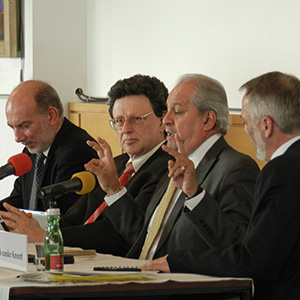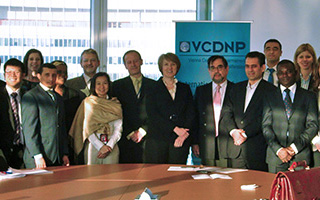

On 17 March 2014, the Vienna Center for Disarmament and Non-Proliferation (VCDNP) hosted a panel discussion entitled "Towards the Third NPT Preparatory Committee Meeting," featuring Ambassador Luis Alfonso de Alba, permanent representative of Mexico to the international organizations in Vienna, Ambassador Alexander Kmentt, director for disarmament, arms control, and non-proliferation of the Austrian Federal Ministry for Europe, Integration and Foreign Affairs, and Ambassador Enrique Roman-Morey, chairman designate of the third session of the Preparatory Committee for the 2015 Non-Proliferation Treaty (NPT) Review Conference. The panel was chaired by Dr. William Potter, director of the James Martin Center for Nonproliferation Studies at the Monterey Institute of International Studies.
Dr. Potter began with an observation that continued as a theme throughout the panel, that discussions on the NPT framework seem to represent two parallel universes: one in which the NPT nuclear weapon states continue to adhere to deterrence strategies and pursue arms control with other nuclear weapon states, and the other universe, where non-nuclear weapon states seek genuine progress toward a world without nuclear weapons. The future of the NPT depends upon finding a common ground between the two and the ability of these states to cooperate on nuclear disarmament. One way in which non-nuclear weapon states have recently inserted themselves into these debates is through the reinvigorated discourse on the humanitarian consequences of nuclear weapons. Panelists agreed that the consideration of humanitarian consequences of nuclear weapons does not weaken the NPT, but rather strengthens it.
The panelists discussed ways in which meaningful common ground could be found between nuclear and non-nuclear weapon states. The latter perceive the slow pace of progress toward disarmament as undermining the credibility of the NPT. In their view, one of the steps toward real progress in nuclear disarmament could be a reaffirmation by the nuclear weapon states of their commitment to their NPT obligations under Article VI accompanied by an action plan for nuclear disarmament, which lays down binding steps within a specified time limit, without any qualifications. Another measure called for by non-nuclear weapon states is greater transparency about nuclear arsenals, which could be achieved by adopting a standardized reporting mechanism on disarmament progress.
Another broad theme discussed by the panelists was on the expected issues to be raised at the third NPT Preparatory Committee (PrepCom), and the definition of success for the upcoming PrepCom. The panelist agreed that a consensus document could be one measure of success, but other criteria are possible as well, such as an agreement on the agenda and a list of recommendations for the 2015 Review Conference. Additionally, panelists pointed out that the non-nuclear weapon states look forward to the first reports by nuclear weapon states at the forthcoming PrepCom, as required under the 2010 Review Conference Action Plan, and hope that such reports will contain information about concrete steps that have been taken toward disarmament.

The lack of progress in convening a conference on the WMD-free zone in the Middle East remains one of the key topics for discussion at the upcoming PrepCom. Positive developments in the last six months regarding the Iranian nuclear program concerns are likely to positively affect the discussion on a variety of non-proliferation issues, including in the Middle East context. The speakers also agreed that noncompliance issues, such as the challenges of dealing with North Korea, including its withdrawal from the NPT under Article X, are likely to occupy a significant place during the PrepCom.
The final broad theme discussed by the panelists was how the existing groupings of states can affect the NPT process, and whether prospects exist for new or modified political groupings. Panelists did not find that the current groupings could or should be replaced at this time, but instead that coordination between the groups should be enhanced and strengthened. The Non-Aligned Movement was highlighted as one of the most important of such groupings. It will likely retain its leading position in disarmament discussions in the foreseeable future. A more recently created grouping, the Non-Proliferation and Disarmament Initiative, that brings together countries from different regions and involves meetings at the ministerial level, has also begun to play an important role in representing states with varying perspectives on the issues.
During the Q&A session, participants also voiced concern about the possible negative impact that the recent developments in Ukraine could have on the discussions at the PrepCom and also on the disarmament debate in general.


